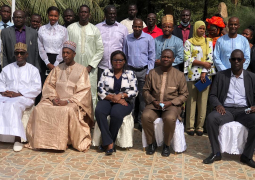‘Isodal’ as the name goes, has been conducting similar study in Liberia, Sierra Leone, Ghana and Nigeria that seeks to assess how the coronavirus pandemic has affected the tourism, fisheries, and the economies ranging from unemployment to wages.
The firm also did such assessment on the business sector particularly on small-scale and medium size enterprises and households in the natural resources sector.
At a recent validation held at the National Nutrition Agency (NaNA), Lamin Nyabally, a consultant for the firm, said the restrictions of corona virus aimed to curb further spread played a ‘great’ disruption of growth within the sectors.
“Measures that are put in place like hand washing, wearing a mask, social distancing. So that alone was a great impediment to movement. So when it happened, we realised at some point so many fishermen left The Gambia especially those fishermen at the coast,” he said.
He also linked the high cost of fish at the time to scarcity of fish in the market due to fishermen taking breaks from fishing in a move to help curb the spread of the virus.
Mr Nyabally said those in fish production and marketing were badly affected by way of opportunities, sales, distributions, income and profitability.
Furthermore, Mr Nyabally indicated that the same thing goes to those who are in the craft sector, women and men in the tourism sector also suffered same.
He recalled that during the closure of borders, no tourists come and hotels did not function as expected. Commenting on the lessons learned and recommendations, the consultant noted government’s failure to act on time to minimise the spread of the virus, saying there has been a little complacency on the part of the government as indication suggests that government procrastinated when the virus emerged in West Africa.
The validation attracted officials from the Ministry of Fisheries, Tourism and Health as well as NGOs.




